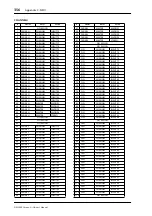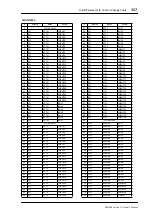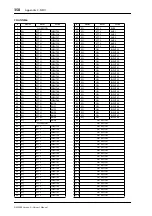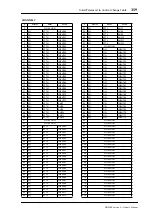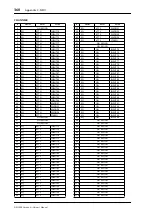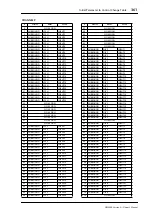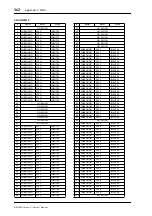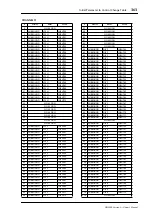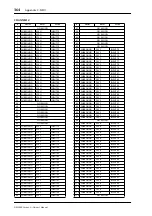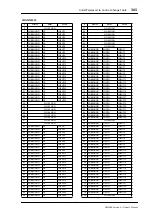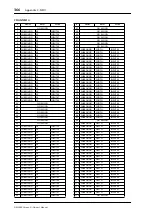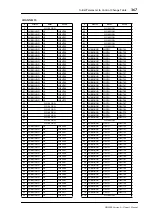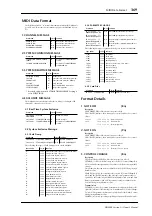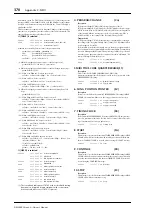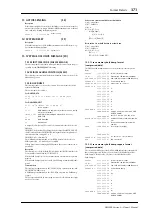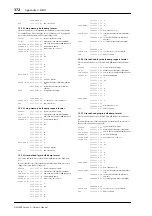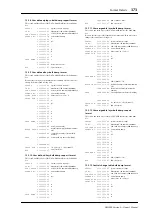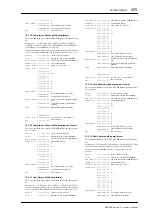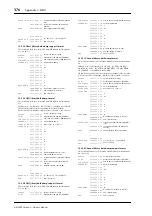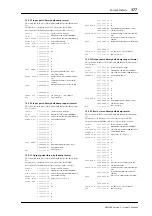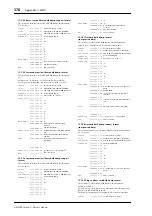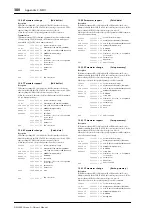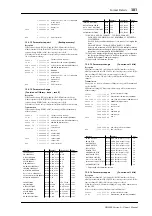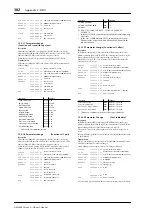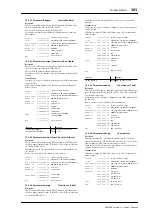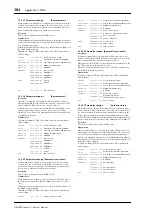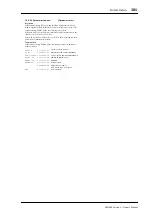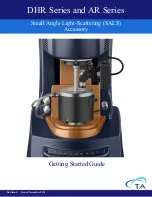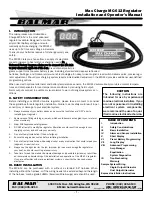
370
Appendix C: MIDI
DM2000 Version 2—Owner’s Manual
transmitted on the [Tx CH] if [Control Change Tx] is ON, using the four
messages NRPN control number (62h, 63h) and Data Entry control num-
ber (06h, 26h). Parameter settings are defined in the Control Change As-
sign Parameter List.
This data cannot be transmitted via Program Change to Studio Manager
since there is no guarantee that the contents of the tables will match. (Pa-
rameter Change messages will always be used.)
If [TABLE] is selected
Formula for converting Control values into parameter data:
paramSteps= paramMax - pa 1;
add=
paramWidth / paramSteps;
mod=
paramWidth - add * paramSteps;
curValue=
parm * add + mod / 2;
(1) When the assigned parameter can be set in 128 steps or less:
paramWidth = 127; rxValue = Control value;
(2) When the assigned parameter can be set in 128 through 16383 steps:
paramWidth = 16383;
(2-1) When both High and Low data are received:
rxValue = Control value (High) * 128 + Control value (Low);
(2-2) When only Low data is received:
rxValue = (curValue & 16256) + Control value (Low);
(2-3) When only High data is received:
rxValue = Control value (High) * 128 + (curValue & 127);
(3) When the assigned parameter can be set in 16384 through 2097151
steps:
paramWidth = 2097151;
(3-1) When High, Middle, and Low data are received:
rxValue = Control value (High) * 16384 + Control value (Middle) *
128 + Control value (Low);
(3-2) When only Low data is received:
rxValue = (curValue & 2097024) + Control value (Low);
(3-3) When only Middle data is received:
rxValue = (curValue & 2080895) + Control value (Middle) * 128;
(3-4) When only High data is received:
rxValue = (curValue & 16383) + Control value (High) * 16384;
(3-5) When Middle and Low data are received:
rxValue = (curValue & 2080768) + Control value (Middle) * 128 +
Control value (Low);
(3-6) When High and Low data are received:
rxValue = (curValue & 16256) + Control value (High) * 16384 +
Control value (Low);
(3-7) When High and Middle data are received:
rxValue = (curValue & 127) + Control value (High) * 16384 + Con-
trol value (Middle) * 128;
if ( rxValue > paramWidth)
rxValue = paramWidth;
param = ( rxValue - mod / 2) / add;
If [NRPN] is selected
*1) The second and subsequent STATUS need not be added during
transmission. Reception must be implemented so that recep-
tion occurs whether or not STATUS is present.
4. PROGRAM CHANGE
(Cn)
Reception
If [Program Change ECHO] is ON, these messages are echoed.
If [Program Change RX] is ON and the [Rx CH] matches, these messages
will be received. However if [OMNI] is ON, they will be received regardless
of the channel. When a message is received, a Scene Memory will be re-
called according to the settings of the [Program Change Table].
Transmission
If [Program Change TX] is ON, this message is transmitted according to
the settings of the [Program Change Table] on the [Tx CH] channel when
a scene memory is recalled.
If the recalled scene has been assigned to more than one program number,
the lowest-numbered program number will be transmitted. Transmission
to Studio Manager using Program Change messages will not be performed
since there is no guarantee that the contents of the tables will match. (Pa-
rameter Changes will always be used.)
5 MIDI TIME CODE QUARTER FRAME(F1)
Reception
This is echoed if [OTHER COMMANDS ECHO] is ON.
Automix synchronizes this if the data is received at the port specified by the
TIME REFERENCE setting.
6. SONG POSITION POINTER
(F2)
Reception
If this is received when the automix TIME REFERENCE setting is MIDI
CLOCK, the automix will move to the song position that was received.
7. TIMING CLOCK
(F8)
Reception
If the automix TIME REFERENCE setting is MIDI CLOCK, this message
is used to synchronize automix. It is also used to control effects. This mes-
sage is transmitted 24 times per quarter note.
8. START
(FA)
Reception
This message is received if the automix TIME REFERENCE setting is MIDI
CLOCK, and will start the automix. In actuality, automix will start when
the next TIMING CLOCK is received after receiving the START message.
9. CONTINUE
(FB)
Reception
This message is received if the automix TIME REFERENCE setting is MIDI
CLOCK, and will cause automix to start from the current song position. In
actuality, automix will start when the next TIMING CLOCK is received af-
ter receiving the CONTINUE message.
10. STOP
(FC)
Reception
This message is received if the automix TIME REFERENCE setting is MIDI
CLOCK, and will cause automix to stop.
STATUS
1011nnnn Bn
Control change
DATA
0nnnnnnn nn
Control number (0-95, 102-119)
0vvvvvvv vv
Control Value (0-127)
STATUS
1011nnnn Bn
Control changeDATA
01100010 62
NRPN LSB
0vvvvvvv vv
LSB of parameter number
STATUS
1011nnnn Bn
Control change*1
DATA
01100011 63
NRPN MSB
0vvvvvvv vv
MSB of parameter number
STATUS
1011nnnn Bn
Control change*1
DATA
00000110 06
MSB of data entry
0vvvvvvv vv
MSB of parameter data
STATUS
1011nnnn Bn
Control change*1
DATA
00100110 26
LSB of data entry
0vvvvvvv vv
LSB of parameter data
STATUS
1100nnnn Cn
Program change
DATA
0nnnnnnn nn
Program number (0-127)
STATUS
1100nnnn F1
Quarter frame message
DATA
0tttdddd td
Type & data
STATUS
11110010 F2
Song position pointer
DATA
0vvvvvvv vv
Song position LSB
0vvvvvvv vv
Song position MSB
STATUS
11111000 F8
Timing clock
STATUS
11111010 FA
Start
STATUS
11111011 FB
Continue
STATUS
11111100 FC
Stop

